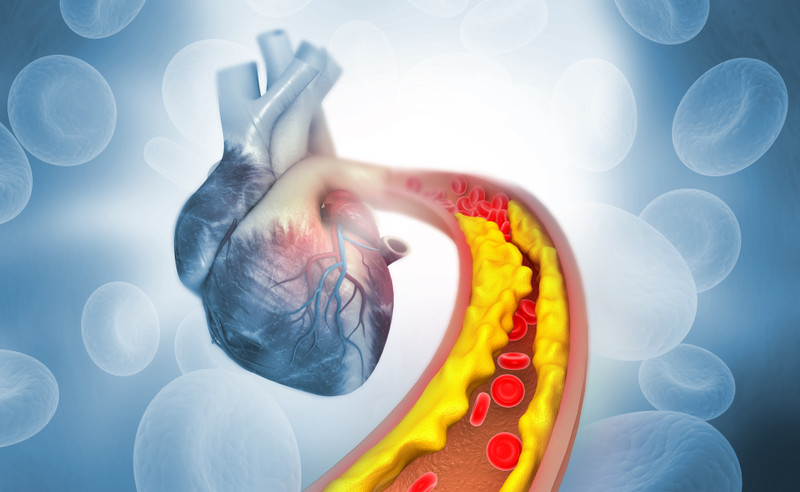This might be old news for anyone familiar with the importance of maintaining healthy cholesterol levels in their body, but it bears repeating. Not all cholesterol is bad and will clog up your arteries.
Yes, increasingly high levels of LDL (low-density lipoprotein) cholesterol – “bad cholesterol” – can eventually increase your chances of a heart attack or stroke. But just like there are two kinds of witches in the land of Oz, good and bad, there is also good cholesterol circulating in your body, and it goes by the designation of HDL (high-density lipoprotein), or “good cholesterol” of which you want sufficient levels in your body.
Where Does Cholesterol Come From?
The answer to the question pretty much comes down to two sources: your liver, which manufactures cholesterol, and the food you eat, which is where the biggest variation in the amount of cholesterol being supplied to your body comes from. Foods that are composed of saturated and trans fats can entice your liver to produce extra, mostly unwanted cholesterol, while foods with lesser amounts of those types of fat are, naturally, considered healthier.
What it all comes down to are numbers, beginning with the premise that you want low levels of bad (LDL) cholesterol and more of good (HDL) cholesterol. The recommended cholesterol levels are less than 200 milligrams per deciliter (mg/dL) for total cholesterol, less than 100 mg/dL for LDL cholesterol, and 60 and above mg/dL for HDL cholesterol.
Treatment Options for High Cholesterol
Ordinarily the first course of action prescribed for a patient to achieve a healthier cholesterol level involves lifestyle adjustments, namely diet and exercise. Prescription medications are typically the next-tier recommendation if simple lifestyle changes are deemed insufficient, although a well-conceived and monitored strategy is to try vitamins and supplements known to help mitigate cholesterol levels. At the least, this third option is worth a discussion with your physician or healthcare professional. If you – as the patient – is the one who needs to bring up the topic of supplementation, by all mean, speak up.
6 Natural Remedies to Help Mitigate High Cholesterol
Following are six nutrients and supplements that have shown various levels of success in playing a role to knock down those elevated cholesterol numbers.
Berberine: This popular compound, sourced from plants such as goldenseal and Oregon grape, has been shown able to perform a trifecta – that is, reduce both total and LDL cholesterol while raising the LDL form. In fact, call it a “grand slam” when you count the fact it can also reduce triglycerides. In one study, participants dosed 500 milligrams of berberine daily for three month. experienced a 25% reduction in LDL, 35% reduction in triglycerides and 29% lowering in total cholesterol.
Flaxseed Oil: Both the seeds and oil drawn from flax, a blue flower found in temperate climates, provide a healthy dose of omega-3 fatty acids, whose variety of health benefits include ramping up HDL levels.
Ginger: A study conducted in 2014 demonstrated that ingestion of ginger can reduce total cholesterol and triglycerides. A study done several years earlier indicated that it could reduce LDL while bolstering NDL. That pretty much covers all the bases, right?
Niacin (vitamin B3): It apparently has the potential to lower both LDL cholesterol and triglycerides while also enhancing good (HDL) cholesterol. However, be sure not to exceed recommended dosage – talk to your physician about this – as too much niacin can lead to health outcomes that should be avoided.
Phytosterols: These are plant-sourced waxes that help guard your intestines from absorbing cholesterol. Some food manufacturers even add phytosterols to prepared foods, such as yogurt, which in effect makes for a food source that counteracts the very cholesterol you are eating in that food. Nifty.
Psyllium: This is a fiber made from seed husks found in the Plantago ovata plant. Adding psyllium to your daily dietary regimen (it can be mixed into drinks or foods as well as taken in pill form) has been shown to have a noticeable effect in lowering cholesterol levels. For good measure it can also help alleviate constipation and reduce blood sugar for diabetics.
Anyone who has been diagnosed with high cholesterol by a physician, or even at a borderline level in some cases, will typically be prescribed a remedial course of action that could include diet and exercise and perhaps even prescription medicines to help stave off heart attack or stroke in the long run. But vitamins and supplements can also play a life-enhancing role when it comes to managing cholesterol levels. If you are diagnosed with high cholesterol, be sure to broach the topic of supplementation with your healthcare professional.

